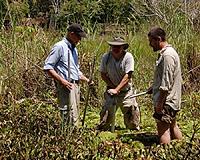| . |  |
. |
New York NY (SPX) Mar 31, 2011 When thousands of ministers, scientists and activists descended on the Mexican resort town of Cancun for another gruelling round of talks on climate change last December, there was little of the debate about the science of global warming that marked the chaotic 2009 meeting. The weather had seen to that. From scorching heat and wildfires in Russia to droughts in Australia, floods in Pakistan and snow in the southern US, the evidence of extreme shifts in the world's climate was impossible to ignore. There was plenty of heat inside the conference as well. For African and other poor developing countries, Lesotho Minister of Natural Resources Monyane Moleleki told delegates, progress at Cancun "remains a matter of survival." Speaking on behalf of the 48 Least Developed countries, Mr. Moleleki noted that they are already experiencing the effects of climate change: "sea level rises" from melting polar ice caps, "enhanced land degradation, declining land-carrying capacity, drought and biodiversity loss, to name a few." And the poorest countries, he continued, "are the most vulnerable, because they have the least capacity to adapt."
Surprising success African and other developing countries had long argued for the establishment of such a fund, which is supposed to raise $100 billion annually by 2020 from levies on carbon emissions and air travel, and what the agreement describes as other "predictable and reliable" sources of finance from the industrialized North. Whether the promised Green Fund will materialize is another matter. As some observers noted, details about its financing were notably lacking, and pledges made at highly visible international conferences are not always met after the television cameras move elsewhere. Ethiopian Prime Minister Meles Zenawi, the chief spokesperson on climate change for the African Union (AU), reminded the leaders of developed countries on the eve of the conference that climate finance "is not aid ... it is not assistance.... It is paying the price for their ... emissions, for which we in Africa have borne the brunt for too long." Tosi Mpanu-Mpanu, the director of the African negotiating team at Cancun, told reporters that after some donors "double-counted" development aid as adaptation finance after the 2009 meeting, "we still have to resolve the issues around transparency on the pledges."
Forest agreement inked Developing countries had previously resisted calls for mandatory cuts in their emissions, arguing that industrial countries are responsible for the vast majority of pollutants. The onus is on them, the argument went, to reduce their emissions to allow African, Asian and Latin American countries to industrialize, even though some developing countries, including China and India, are large carbon emitters. Finding a formula acceptable to rich and poor countries, however, must await future negotiations. Durban conference will be key Agreement on the scope and timing of the key issue of emissions reductions remained elusive at Cancun, however. African countries, which are likely to suffer the most from climate change, have argued for deep cuts to keep disruptions to a minimum. Many industrialized countries have resisted, arguing that large and rapid reductions are too costly and will damage the global economy. Other analysts argue that for developing countries to be able to grow while keeping overall pollution within safe limits, developed countries will have to make even deeper emissions cuts than they currently foresee. The question of how much to cut - and at what cost and to whom - has been a major impediment to action against climate change for years. Addressing this thorny issue, and thrashing out the details of the Cancun agreements, will form the agenda for the next major meeting in Durban, South Africa, at the end of 2011. Despite the urgency of the challenge, there is no guarantee of success, particularly with much of the industrialized North still mired in a major economic slump. More can and must be done, insisted UN Secretary-General Ban Ki-moon: "I am deeply concerned that our efforts so far have been insufficient," he told delegates. "Despite the evidence and many years of negotiations we are still not rising to the occasion.... We need results now, results that curb global ... emissions, strengthen our ability to adapt and help to create a more sustainable prosperous future.... The longer we delay, the more we will have to pay - economically, environmentally and in human lives."
Share This Article With Planet Earth
Related Links UN Economic Commission for Africa Climate Science News - Modeling, Mitigation Adaptation
 UC Research Explores Why Ancient Civilization Was Living On The Edge
UC Research Explores Why Ancient Civilization Was Living On The EdgeCincinnati OH (SPX) Mar 30, 2011 University of Cincinnati research is investigating why a highly sophisticated civilization decided to build large, bustling cities next to what is essentially swampland. The research by UC Geography Professor Nicholas Dunning, a three-year, interdisciplinary project including David Lentz, professor of biological sciences, and Vern Scarborough, professor of anthropology, will be presented April 1 ... read more |
|
| The content herein, unless otherwise known to be public domain, are Copyright 1995-2010 - SpaceDaily. AFP and UPI Wire Stories are copyright Agence France-Presse and United Press International. ESA Portal Reports are copyright European Space Agency. All NASA sourced material is public domain. Additional copyrights may apply in whole or part to other bona fide parties. Advertising does not imply endorsement,agreement or approval of any opinions, statements or information provided by SpaceDaily on any Web page published or hosted by SpaceDaily. Privacy Statement |